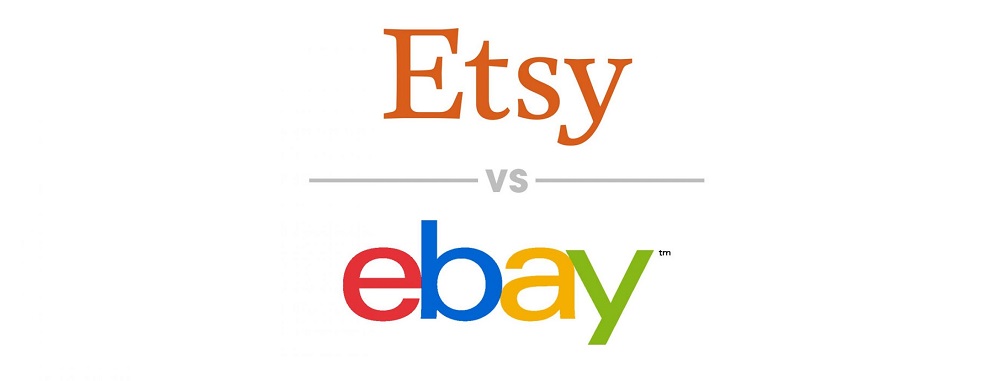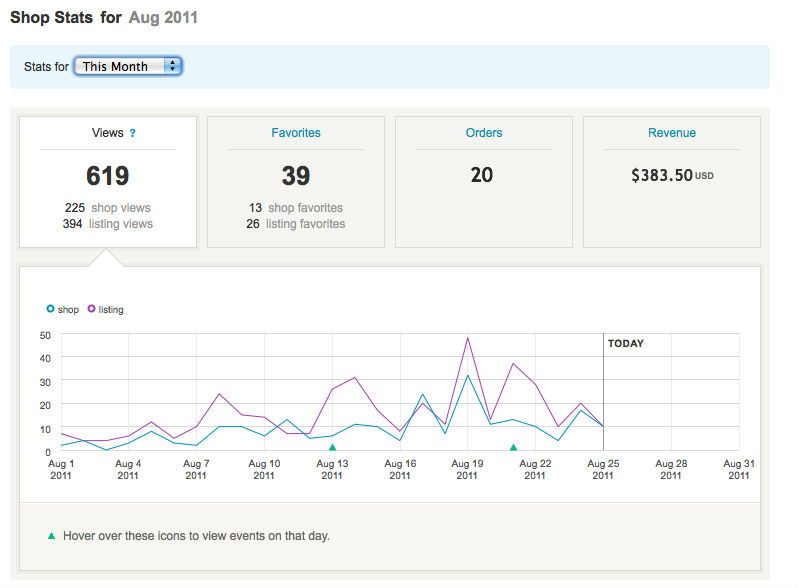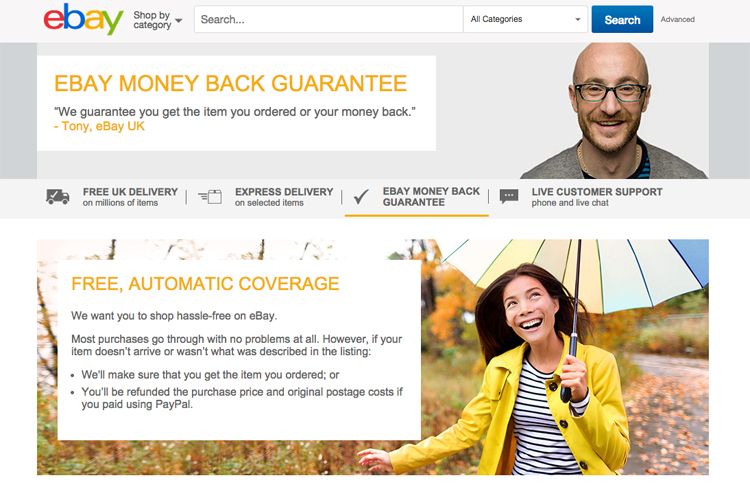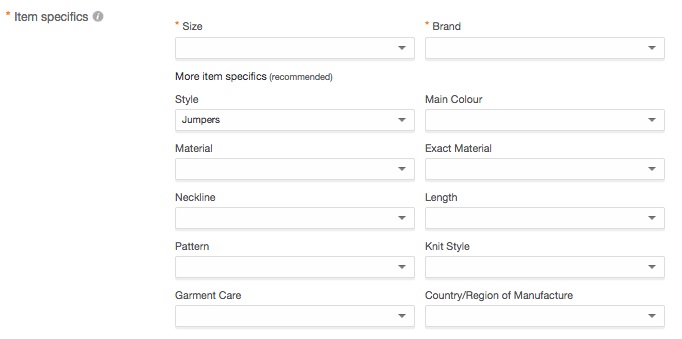
Etsy vs eBay... They're both popular platforms that are used by many budding entrepreneurs that want to start an online business. We'll outline the pros and cons of both platforms in this article.
We have already written a detailed review of Etsy as a platform, which you can read here.
Etsy is an online marketplace that has a fantastic bustling community of artists, designers and crafters selling their unique hand-crafted or vintage goods. This is all you can buy on Etsy, unlike eBay where you can sell just about anything. As long as it's legal, that is...
Products sold on Etsy fall into the category of either arts, crafts, jewellery, homeware or baked goods. Sellers are also encouraged to stock 'vintage' items, which Etsy defines as at least 20 years old. Unless you sell any of these, it would probably be futile to sell on Etsy, as that is what the people visiting Etsy shops are looking for.
With over 1,000,000 active shops, Etsy is a platform that is always rising in popularity, with more and more online shoppers acknowledging that it is a great place to find unique items and gifts that aren't sold elsewhere.
Here are the main pros and cons for selling on Etsy:

A very appealing benefits for selling on Etsy is that it can offer you membership in a very large, previously-established community. While any small business should be constantly marketing themselves regardless, knowing that a lot of people visit Etsy could potentially help with having customers find you. Do bear in mind that traffic to Etsy does not equal traffic to your shop. You still have to make your products enticing and try to get featured by Etsy.
While a clear benefit of using Etsy, this is not something that is unique to its platform, and eBay offers the same level of traffic, if not even more.
"Patience is a virtue, but time is a commodity," a wise person once said, and in the world of e-commerce this often rings true. If you want to begin selling your products as soon as possible, Etsy could be the route for you. It has a really easy and fast sign up process, and even offers a 'Sign Up Using Facebook' button. Once you have your account, you could start selling in just a few hours. If you have your product photography and descriptions ready, that is! Particularly beneficial if you want to start selling during peak shopping times of the year.
If you think of the alternatives for sellers of unique items, like Not On The High Street, or having a bespoke website designed and made for you, neither can offer such a quick way to get selling quite like Etsy can. Not On The High Street takes a while to review your application to sell on their platform, while web design takes multiple weeks.
eBay also has a quick sign up process, though it does not have a 'Sign Up Using Facebook' button.

One of the best ways to keep customers visiting your online shop time after time is to offer a loyalty incentive. A great thing about Etsy is that it makes it very easy for you to implement various discount codes and shared shipping costs for the same customers. It's an excellent marketing tool that you can use to potentially drive customers back to your shop and gain more repeat orders.
eBay will let you customise your shipping costs, as well as discounting a customer's shipping if they buy multiple items, but it currently does not give sellers the feature of being able to construct their own discount codes.
It really does not cost you much to get set up selling on Etsy, especially when you consider the alternatives available to sellers of unique items: Not On The High Street, or a bespoke website for your products. Not On The High Street charges £199 + VAT as their joining fee (around £240), and takes a 25% commission on all sales you make, while having a website designed will cost even more. Etsy, on the other hand, lets you set up your shop for free. However, Etsy does charge $0.20 to list an item and takes 3.5% commission, so while it is low cost, there is not no cost.
eBay intitally seems like a cheaper alternative to Etsy because of the free listings it famously offers, but this is not necessarily the case. Firstly, it does offer 200 'free' listings a month to business sellers, but to get these you have to pay a £19.99 monthly charge. This would still be slightly cheaper than if you were to list 200 items on Etsy a month, but it becomes more expensive when you realise eBay imposes a final value fee on all of your sales, which ranges from 8-11% depending on the category you sell in.

Etsy used to offer live chat to all of their sellers, but unfortunately the fast-expanding nature of the platform meant that they were forced to put a stop to this service in 2011, after not being able to cope with the demands of their sellers. A lot of people on Etsy's forum have expressed a lot of anger and upset over this, claiming that the live chat feature was their lifeline when they first started their online shop and now their problems aren't dealt with as efficiently as they once were. You can see this in the screenshot above. It seems that Etsy was not prepared for its increase in users and has thus had to dilute its existing resources to make them stretch.
An issue that is universally deplored by all those that sell on Etsy is that there is far too much competition. This is worrying enough in itself, before you learn that it's estimated that there are more sellers on Etsy than there are buyers. The number of sellers is also rising all the time. With so many of your competitors selling on the same platform as you, it may be hard for you to stand out and make many sales on Etsy.
eBay is also oversaturated, with far more active sellers than Etsy, but there is also nearly eight times more traffic and consumer demand on eBay, so while still an issue, it is generally less prevalent.
You can overcome this by putting more time and money into marketing, and generally sharpening and honing the elements of your marketing mix, which is discussed in more detail in our Etsy review.

Etsy's fees are $0.20 to list each item, which is only listed for four months. They also charge 3.5% of the product's price price when it sells. When you consider the previous point, that it's already hard to find customers because of the saturated nature of the platform, it's frustrating that when you do start making sales Etsy also profits off of your success. The rates are much higher than if you sold through your own ecommerce website, though of course you'd need to do all the hard work of attracting visitors yourself. The fees may be worth this alone, especially for new businesses trying to build an audience.
Selling on Etsy is not nearly as personalised as having your own beskpoke e-commerce shop. The platform does offer some customisation tools, but they aren't extensive. You can add a banner to your shop and write up shop policies, but your URL will end in '.etsy.com', which can make your business seem less professional. Etsy, unlike eBay, does not offer HTML customisation, so the customisation of your shopfront is always going to be limited.
If you want your shopfront to be completely bespoke to your business's brand, you will need a website designed for you. Etsy is a marketplace aimed at many different kinds of sellers, and doesn't offer the level of customisation that you may be looking for.
Alternatively, eBay does offer HTML customisation. So if you have a good command of HTML you can brand both your shopfront and your product listings.

If you're a bit of a control freak – and let's face it, who isn't? – then you might find being at the mercy of Etsy slightly unnerving. They reserve the right to suddenly shut your store down or change their fees without notice, so you never have the security of knowing that your business is safe. If Etsy put their fees up and you could no longer afford to run your business and make a profit, you could end up in a difficult situation.
You can see this plainly written in Etsy's Terms of Use in the extract pictured above.
eBay also reserves the same right, which can be seen in their User Agreement here:

Again, the only way to have absolute control over your business's future is to sell independently from Etsy and eBay, by starting up your own online shop.
Conceived in 1995, eBay is a perfect example of an online company that succeeded during the dot-com boom of the late '90s. Originally intended as an online garage sale, with all products being bidded on by anyone with an account, eBay has slowly tried to erase this mentality and devleop their company into one that isn't seen as a cheap outlet. After introducing the 'Buy It Now' feature for sellers to put on their listings, auctions were no longer the only available option.
Those fortunate enough to have sold on eBay during the early noughties will have fond memories of being able to list an item knowing that there will be someone out there that will bid on/buy it. Unfortunately, eBay's landscape has evolved and it no longer like this. Now, with far more competition than there used to be, sellers have to try a lot harder to get their products seen and bidded on. eBay has even added a feature where sellers can open an 'eBay Shop', complete with shopfront, much like Etsy.
Here are the main pros and cons of using eBay:

eBay received 84.52m unique US visitors in January 2014, making it stand behind only Amazon in terms of traffic. This is terrific news for anyone thinking about selling on the platform because, ultimately, the more people accessing eBay results in more people having the potential to see your products.
Compared to Etsy's 10.64m unique US visitors in January 2014, eBay is clearly soaring ahead when it comes to traffic.
Another massive benefit of eBay is that it has been an internationally recognised e-commerce site for well over a decade, whereas Etsy is only beginning to gain momentum now. If you wish to maximise your profits, you'll want to sell to international customers, and, purely because of its command of international markets, eBay is the better platform for this.
Etsy only allows you to run prix fixe listings, whereas the main Unique Selling Proposition (USP) of eBay is that your listing can be either an auction or have a 'Buy It Now' button. Alternatively, you can have both on one listing.
If you don't know the value of the items you are selling – maybe you found them in the attic, maybe you inherited them, or maybe they were given to you by a shadowy figure down a dark alleyway – then you can put them up with a low starting price and sit back and watch how the auction develops.
eBay is a hub of rare items, once in a lifetime purchases, like Britney Spears' used chewing gum. If you want to experiment with item values, eBay allows you to do that easily and effectively.

Unfortunately, there are sometimes problem buyers on eBay. For some reason, there are people that put bids on items and refuse to pay for them when they win. eBay is totally aware of this issue, but because there isn't really anything they can do to stop it, they have put protections in place for their sellers. Normally, any protection offered by online selling platforms is designed for the buyer, so it is pleasant to know that eBay cares equally about their sellers.
In addition to protections put in place for you, eBay will also mediate between you and your buyer, which provides a sense of authority and oftens gets problems solved much quicker.
This protection is also win-win because buyers are more likely to make a purchase from your shop if they know they cannot be scammed out of their money or item.
Any online business needs to be Search-Engine-Optimised. Without it, you won't have access to the customers that you need in order to be successful, and will lag behind your competition.
A massive benefit to using eBay as an online selling platform is that, in addition to having a large portfolio of dedicated repeat visitors, eBay also has an SEO team that attempt to drive people from Google to your shop.
eBay is still behind Amazon in terms of traffic to its site, so having excellently maintained SEO is crucial to ensure that your sales aren't lost to sellers that are operating on different platforms.
While Etsy recommends you use best practices to optimise your shop for SEO, eBay actually has a team working on it, making it even easier for you.

It is true that eBay allowing its sellers to customise their shop with HTML is a fantastic thing, but, realistically, the average seller is not going to have any idea how to write or edit HTML snippets.
Using eBay's built-in customisation tools will be very limiting and will still give your shopfront and product pages a very 'template' feel.
The fact that you can only effectively customise your shop by knowing HTML is a real downside for eBay, as this puts a big barrier between you and your brand.

If you have ever listed an item on eBay, even casually as a private seller, you will undoubtedly remember how long it took you to get from A to Z. For some reason, eBay makes it so that their system to list a product is not very intuitive and takes a long time.
In recent years, they have added a feature that guesses your product's category based on the title you give it. This is the only element of the listing process that is intuitive and even this is not always accurate.
The box to write your product description in is very small and only only offers you 7 fonts. Unless you use the HTML editor, it is difficult to make your product descriptions stand out from millions of others on eBay with the only options for formatting being bold, italic, underline and bullet points.

eBay's commission rates, while not quite as extreme as Not On The High Street (25%), are quite high, ranging from 8-11%, depending on the category that the item sells in. They call it a 'final value fee', and the percentage is of the total cost – that is, including whatever shipping costs you charge.
Etsy only charges 3.5% commission for each sale, regardless of what category it is sold in. This fee, unlike eBay, does not include the shipping cost of the item.
You will need to evaluate whether or not you think eBay having more traffic than Etsy is enough of a reason for it to charge upto 7.5% more commission per item.
If you decide that you have to end an auction early, with buyers having already placed bids on the item, you may be charged a fee. This fee is the same as a final value fee, which is explained above, and will be based on the item price when you ended the auction.
There are cases where you don't have to pay a removal fee, however. These are: when you cancel your auction within the first 24 hours of it being listed, or if eBay decide to intervene and end your auction.
Etsy, on the other hand, will not charge you to delete any listing you like.
If you are selling handmade, craft-related, or vintage items, Etsy is certainly the cheaper and quicker option to get your online shop set up. Though, despite this, you should not forget that traffic to eBay is exceptionally higher than traffic to Etsy. However, Etsy succeeds where eBay fails by having a focused target audience – in Etsy's case, people after unique and interesting products. eBay is a platform used by everyone, so your individuality could be lost. Both platforms clearly offer their own benefits, and do bear in mind that many e-tailers choose to have shops on both.